Welcoming news that oil demand may never recover to pre-pandemic levels, Greenpeace noted that “a #GreenRecovery will hasten its demise.”
By Jessica Corbett, staff writer for Common Dreams. Published 9-14-2020

BP’s annual report on the future of energy, released Monday, says demand for oil may have peaked last year and projects significant growth in renewables over the next three decades. (Photo: tolkien1914/flickr/cc)
As communities worldwide face off against and file suit over the devastating impacts of a climate crisis notably driven by fossil fuel giants, BP on Monday gave just the latest signal that the dirty energy industry is dying—admitting that global demand for oil may have already peaked while projecting significant growth in renewables over the next few decades.
The new edition of BP’s annual Energy Outlook features three potential transition scenarios to 2050, the year by which the British firm says it intends to deliver its net-zero ambition. The forecast, Reuters reported, “underpins chief executive Bernard Looney’s new strategy to ‘reinvent’ the 111-year old oil and gas company by shifting renewables and power.”
BP’s 2020 Energy Outlook is an interesting read. The main points:
– Fossil fuel consumption to drop for first time in history soon
– #Oil demand might have peaked (if not then by 2030)
– Renewables set for fastest growth of any energy ever#OOTT @bp_plchttps://t.co/YH1DWuQeDy pic.twitter.com/wjHvfAzmzX— Ron Bousso (@ronbousso1) September 14, 2020
The outlook comes several months into the coronavirus pandemic, which has killed over 925,000 people, sickened more than 29 million, and wreaked havoc on the global economy. In the midst of the related public health and economic crises, residents of the western U.S. are battling historic wildfires while those on the Gulf Coast brace for Hurricane Sally’s arrival.
Scientists have explained that the raging fires and devastation from hurricanes are connected to human-caused climate change, and warned that as global temperatures continue to rise, humanity will face more danger and destruction. Experts have also emphasized that despite a brief dip in emissions during Covid-19 lockdowns earlier this year, the climate crisis hasn’t slowed or stopped due to the pandemic.
As governments across the globe grapple with the consequences of the climate and public health emergencies—along with calls to build back better and rapidly phase out fossil fuels—the BP report “in effect sounds a death-knell for the growth of global oil demand after two of the report’s three energy scenarios for the next 30 years found that demand reached a peak in 2019,” according to The Guardian.
In BP’s least aggressive scenario, considering the possibility of less ambitious government policies that aim to meet the global temperature goals of the 2015 Paris climate accord, “oil demand plateaus at similar levels seen in 2019 through the 2020s before declining from 2035,” the newspaper added.
BP chief economist Spencer Dale told reporters Monday that the transition to clean energy “would be an unprecedented event,” noting that “never in modern history has the demand for any traded fuel declined in absolute terms.” Meanwhile, he said, “the share of renewable energy grows more quickly than any fuel ever seen in history.”
“BP’s influential annual report on the future of energy, published on Monday, says oil will be replaced by clean electricity from windfarms, solar panels and hydropower plants as renewable energy emerges as the fastest-growing energy source on record.” #GreenRecovery #PeakOil pic.twitter.com/H2V93vHKbn
— Greenpeace Canada (@GreenpeaceCA) September 14, 2020
“The BP Energy Outlook is invaluable in helping us better understand the changing energy landscape and it was instrumental in helping us develop our new strategy,” Looney said in a statement Monday. “Even as the pandemic has dramatically reduced global carbon emissions, the world remains on an unsustainable path.”
“However, the analysis in the outlook shows that, with decisive policy measures and more low carbon choices from both companies and consumers, the energy transition still can be delivered,” the CEO added. “It is one of the reasons I remain optimistic about the future and I hope readers will find the report helpful as we all try to make a difference.”
BP’s report follows a July analysis from the Center for International Environmental Law (CIEL), a U.S.-based policy research and advocacy group, which found that the British corporation and other fossil fuel firms such as ExxonMobil “are racking up debt to maintain their shareholder payments and sustain their image as sound investments.”
“Oil and gas companies are also writing down and selling off their assets at heavily discounted prices,” CIEL noted, “in a move that reflects a desperate need for cash and growing skepticism about the future value of fossil fuels.”
Though the oil major is purportedly charting a new path, BP has been named in several of over 20 lawsuits that local and state governments in the U.S. have filed in the past few years, seeking to make fossil fuel giants pay for polluting the planet and take the burden off taxpayers to cover the costs of consequences like sea-level rise.
“The climate crisis Big Oil caused is engulfing the nation, and it is costing communities billions of dollars,” Richard Wiles of the Center for Climate Integrity said last week, as Delaware’s attorney general sued 31 fossil fuel companies including BP. “It is clear that Big Oil is facing its ‘Big Tobacco moment,’ and accountability is coming for them.”

